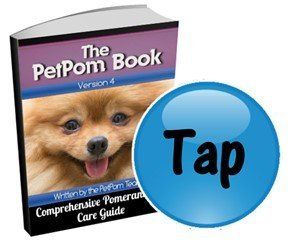Supplements for Pomeranians
Overview
Daily Vitamins and Minerals
What these are:
The needs of a canine are not quite like those of a human, so you’ll find that vitamin and mineral supplements for dogs do differ slightly.
You typically will not see such ingredients as vitamin K, selenium, or chromium.
However, a good daily vitamin and mineral for canines will have (in alphabetical order: Calcium, copper, folic acid, iodine, iron, phosphorus, potassium, magnesium, niacin, vitamin A, vitamin C (ascorbic acid), vitamin D3, vitamin E, vitamin B1 (thiamine), vitamin B2 (riboflavin), vitamin B5 (pantothenic acid), vitamin B6 (pyridoxine), vitamin B12, and zinc.
Which Pomeranians should have a daily vitamin and mineral:
Which Pomeranians should have a daily vitamin and mineral:
1)
Those not on a 5-star, top rated food:
First, it’s important to note that there is a difference between chemically derived vitamins and those found naturally in food.
Jasmine and Elsa,
photo courtesy of Michelle Weiss-Sundberg
Chemical derived vitamins are those isolated from food, and it is thought that these do not work as well as those found naturally.
Vitamins found in foods work differently. They bind with enzymes and amino acids to act which boosts their ability to provide proper nutrition.
Next, you’ll want to note the difference between inferior and superior dog foods.
Inferior dog foods have very little ‘real’, wholesome foods. They’ll be very few fruits or vegetables. Instead, they will use fillers, by-products, and other cheap ingredients and then add in chemically derived vitamins and minerals.
Superior dog foods, on the other hand, will have a good amount of wholesome foods that naturally contain vitamins and minerals. This includes real fruit, real meat, and a range of vegetables. Since these are not chemically derived vitamins and minerals, they will offer a better level of nutrition.
In addition, high-quality dog foods add in extra supplements that help in a number of ways. For example, omega 3’s (great for skin and coat health) and probiotics (good for digestion).
So, the first thing to consider when thinking about giving a Pomeranian extra vitamin and mineral supplements, is to reassess the puppy or dog’s main diet. Is it a superior food? If not, why not?
If you are home cooking, this is covered next. However, when it comes to manufactured foods, you’ll want to be sure that your Pom is eating the very best diet possible.
Inferior foods not only are lacking natural vitamins and minerals, but also contain detrimental ingredients that can harm a dog. This includes chemical preservatives and additives that can cause a wide range of issues from digestive problems to itchy skin reactions.
If a Pomeranian is eating one of the top brands like Wellness CORE Natural Dry Grain-Free for Small Breeds , there is no need for extra vitamins or supplements, unless there is a health issue.
, there is no need for extra vitamins or supplements, unless there is a health issue.
If you are not sure if your Pom is on a really great food, the Dog Food Advisor site
can let you know a brand’s quality rating.
2)
Those eating homemade food:
Home cooking is a great option. This ensures that they’ll be zero additives and you have full control over the ingredients. A good homemade meal will contain natural vitamins and minerals via vegetables and fruits.
However, it’s nearly impossible for a meal to contain everything that a Pomeranian requires. Even the very best commercial brands need to add in extras.
So, if you are home cooking, you also will need to add in vitamins and minerals to round out the diet.
Choosing a daily vitamin and mineral:
Daily canine supplements come in two basic forms: powders and chewable tablets. Powders are sprinkled over food or mixed in, and tablets are given once per day as a treat.
You’ll want to be careful because some canine supplements are marketed as nutritional supplements for ‘overall wellness’ but are not the daily supplements that the Pomeranian will need. Rather, these can be such things as a seaweed blend or just flaxseeds, and will not be the type to round out the diet.
One great choice is Pet MD's Advanced Multivitamins for Dogs . These are made in the USA and are made in FDA, USDA and FSIS (Food Safety and Inspection Service) regulated facilities. These are a great liver flavor, which is well-received by most Pomeranians. You just give 1/2 chewable per day, and this can be given as a treat or crumbled into a meal.
. These are made in the USA and are made in FDA, USDA and FSIS (Food Safety and Inspection Service) regulated facilities. These are a great liver flavor, which is well-received by most Pomeranians. You just give 1/2 chewable per day, and this can be given as a treat or crumbled into a meal.
Glucosamine, Chondroitin
Most people refer to canine joint health supplements as just glucosamine; but this is typically combined with chondroitin, and can also include MSM and Coenzyme Q10 (CoQ10).
What each of these are:
The function of these revolve around a dog’s joints and cartilage:
Glucosamine produces glycosaminoglycan, which repairs body tissue and cartilage (from normal everyday wear and tear or issues stemming from injury or age – more ahead).
Chondroitin works along with the glucosamine by attracting a proper level of fluid into tissue around the joints for healthy shock absorption and lubrication and also supplies nutrients to the cartilage.
CoQ10 is a naturally occurring enzyme that is found in cells throughout a dog’s body. It plays many roles, but mainly supports the immune system, proper function of blood vessels, and works as an antioxidant.
MSM is not naturally occurring in the body. This is an organic compound supplement that works to increase flexibility and reduce pain and swelling.
Which Pomeranians can benefit from glucosamine and chondroitin supplements:
1)
A Pomeranian that is 6+ years:
As a dog ages, the body produces less glucosamine and chondroitin. This leads to joint pain and stiffness, and eventual wear and tear bad enough that osteoarthritis develops. Note that this is often referred to as just ‘arthritis’, but technically arthritis refers to inflammation of the joints and osteoarthritis is the degenerative disease caused by deterioration of joint cartilage.
This can be quite painful and really affect a dog’s mobility. There can be difficulty walking, trouble rising, problems sleeping at night, and other mobility and behavior changes.
It is wise to be proactive about this, and not wait until arthritis sets in to give this supplement to your Pom. While it cannot fully prevent osteoarthritis, it can slow it down. Note that older Poms without osteoarthritis do not need additional CoQ10 or MSM.
-min-306x330-1920w.jpg)
Augie, a rescue (Richardson Rescue in York, SC),
photo courtesy of Steve Ouzts
Choosing a good glucosamine supplement:
1.
For just a glucosamine chondroitin supplement, without any extras, Trader Joe's Glucosamine Chondroitin for Dogs
 is a good choice. If you have one near you, this is sold in their physical stores as well. There’s nothing extra added, and it’s made in the US (California).
is a good choice. If you have one near you, this is sold in their physical stores as well. There’s nothing extra added, and it’s made in the US (California).
These are chewable tablets, and only a very small piece is needed for most adult Pomeranians: For Poms 5 lbs., just 1/4 tablet once per day and larger 10 lb. Poms would get 1/4 tablet twice per day.
2.
For one that has glucosamine, chondroitin, MSM and CoQ10, Doggie Dailies Advanced Hip & Joint Supplement for Dogs
 is a great choice. It also has the additional bonuses of omega 3, omega 6, Vitamin C, vitamin E, and fish oil (salmon and cod liver oil), and Yucca Schidigera (a natural herb known for its joint health benefits). It is made in the USA in FDA regulated facilities.
is a great choice. It also has the additional bonuses of omega 3, omega 6, Vitamin C, vitamin E, and fish oil (salmon and cod liver oil), and Yucca Schidigera (a natural herb known for its joint health benefits). It is made in the USA in FDA regulated facilities.
These are soft chews, and Pomeranians (dogs under 15 lbs.) are given 1 chew per day.
And another very effective one is Infinite's All-Natural Hip & Joint Supplement for Dogs . This has glucosamine, chondroitin, and MSM and additionally has organic turmeric, which is a natural anti-inflammatory.
. This has glucosamine, chondroitin, and MSM and additionally has organic turmeric, which is a natural anti-inflammatory.
This is also made in the USA, in a GMP certified facility, which means that it is regulated by the FDA.
Pomeranians taking this one should be given 1/2 chew per day.
Omega 3 Fish Oils for Skin and Coat Health
What this is:
-min-300x313-1920w.jpg)
Cuddles, photo courtesy of George Corbin Sr.
Which Pomeranians can benefit from omega supplements:
Any Pomeranian with common skin and/or coat issues.
Omega can help resolve dry skin, itchy skin, peeling, dry and/or brittle fur, and in some cases, can help the coat grow (often in conjunction with other remedies). See also:
Pomeranian fur loss.
Many of these issues can develop due to allergies, intolerance to certain food ingredients or poor diets (especially food with chemical additives). Even seasonal changes can cause problems, and weakened immune systems often lead to poor skin health.
Choosing a good omega supplement:
There are lots of choices out there, from pills to chews to liquid oils. And these fatty acids can be derived from a wide range of sources.
We recommend a liquid fish oil since this is very easy to give to a Pom. It smells extremely tempting to dogs and most Poms love the taste. In fact, adding fish oil to a meal often encourages a dog to finish his meal.
One that we highly recommend is Zesty Paws's Pure Wild Alaskan Salmon Oil for Dogs & Cats . This is 100% pure fish oil sourced from wild salmon caught off the coast of Alaska. You will see that this also has EPA & DHA listed; these are both types of omega 3s.
. This is 100% pure fish oil sourced from wild salmon caught off the coast of Alaska. You will see that this also has EPA & DHA listed; these are both types of omega 3s.
This comes in a very handy pump, and Poms just need 1/2 pump per day. Once you dispense this over your Pom’s kibble, be sure to mix it up good, or your dog may just try to lick it off those top pieces.
Probiotics
What these are:
In the digestive tract of canines (and humans) there is both ‘good’ and ‘bad’ bacteria. Probiotics are help balance that ‘good and bad’ bacteria for improved and digestive health.
It should be noted that if your Pomeranian has lots of digestive issues such as chronic diarrhea, this is something that warrants a veterinary examination. There may be an underlying condition that requires professional treatment.
In addition, reactions to detrimental ingredients found in inferior dog foods is a top reason for tummy woes. So, you’ll want to be sure to feed your Pom a healthy diet with food that is easily digestible.
Which Pomeranians can benefit from probiotics:
2)
A Pomeranian recovering from an intestinal illness:
If a Pom just had a bout of bad diarrhea or was taking a medication that caused an upset stomach, this can throw off the proper balance of bacteria in the gut. A good probiotic can get things back to normal.
Choosing a good probiotic supplement:
-min-241x335-1920w.jpg)
When it comes to probiotics, it’s important to know that there are different strains of this good bacteria. There is bacillus laterosporus, lactobacillus casei, and a whole bunch with similar long, hard-to-pronounce names. The key takeaway is that you’ll want one that has multiple strains.
For many reasons, Pet Ultimates Probiotics for Dogs
 is a top choice. It contains prebiotic inulin. This is important; it works to properly deliver the probiotics into the intestines. Keeping in mind the need for a wide variety of strains, it contains 22 of the top probiotics that dogs need.
is a top choice. It contains prebiotic inulin. This is important; it works to properly deliver the probiotics into the intestines. Keeping in mind the need for a wide variety of strains, it contains 22 of the top probiotics that dogs need.
This is also a powder, which makes it exceptionally easy to give to a Pomeranian, since most dogs that are already struggling with tummy woes are not receptive to pills.
This lasts a very long time, since most Pomeranians only need 1/8 of a scoop per day. And, finally, this has a 100% guarantee.
Nutritional Supplements for Weight Gain
What these are:
Nutritional supplements for puppies and dogs are also referred to as high calorie supplements or gels.
These are meant to deliver nutrition and calories to puppies that are struggling to gain weight or adults struggling to maintain weight.
The important aspect is that these are designed to do so by offering a lot in a small serving.
And the reason why it’s vital to get a lot in a tiny amount is because puppies and dogs that have trouble eating enough need a simple, palatable method of getting nutritional boosts even if they are not receptive to food.
A gel makes that happen.
Which Pomeranians can benefit from a nutritional gel:
2)
Adults with poor appetites that have trouble maintaining:
If an adult Pomeranian is losing weight or has such a decrease appetite that it is a real battle to maintain proper weight, this also is a huge red flag that a veterinarian visit is needed.
This said, a Pom may be recovering from or living with a known condition in which there is decreased appetite. In these cases, this sort of supplement can help.
Choosing a good nutritional supplement:
There are several on the market, however one of the very best is also one of the most well-known. Tomlyn High Calorie Nutritional Gel for Puppies , also known as Nutri-gel, is very effective. Note that there is also an adult formula as well.
, also known as Nutri-gel, is very effective. Note that there is also an adult formula as well.
This is a pleasant tasting gel that delivers protein, healthy fats, and wide range of vitamins and minerals. There are 28 calories per teaspoon.
And that is a lot of a Pomeranian. Puppies need about 55 calories per day for each pound of body weight. So, for example, a 2-pound pup needs about 110 calories per day and one teaspoon of this delivers 25% of those needed calories.
Summary
There’s no reason to give supplements to your Pomeranian if your puppy or dog is eating quality food and has no health issues to speak of. However, if your Pom does have any of the issues that we’ve covered here, or is reaching his/her senior years, the right quality supplements can make a world of difference.
You May Also Like:
Playpens for Pomeranians
- See what a huge difference it can make when you have the right type of playpen for your Pom puppy or dog.
Car Seats for Pomeranians
- If you'd buckle up a baby, buckle up your Pom. See which types of seats are safe and can cut down on motion sickness.
Helping a Pom with Separation Anxiety
- It's never fun leaving your Pom home alone, but it's even worse if you know that your dog is stressed when you're gone. See helpful tips to keep your Pom happy.



-min-240x320-1920w.jpg)
-min-190x335-1920w.jpg)

-min-279x335-1920w.jpg)
-min-251x335-1920w.jpg)

-min-290x335-1920w.jpg)
